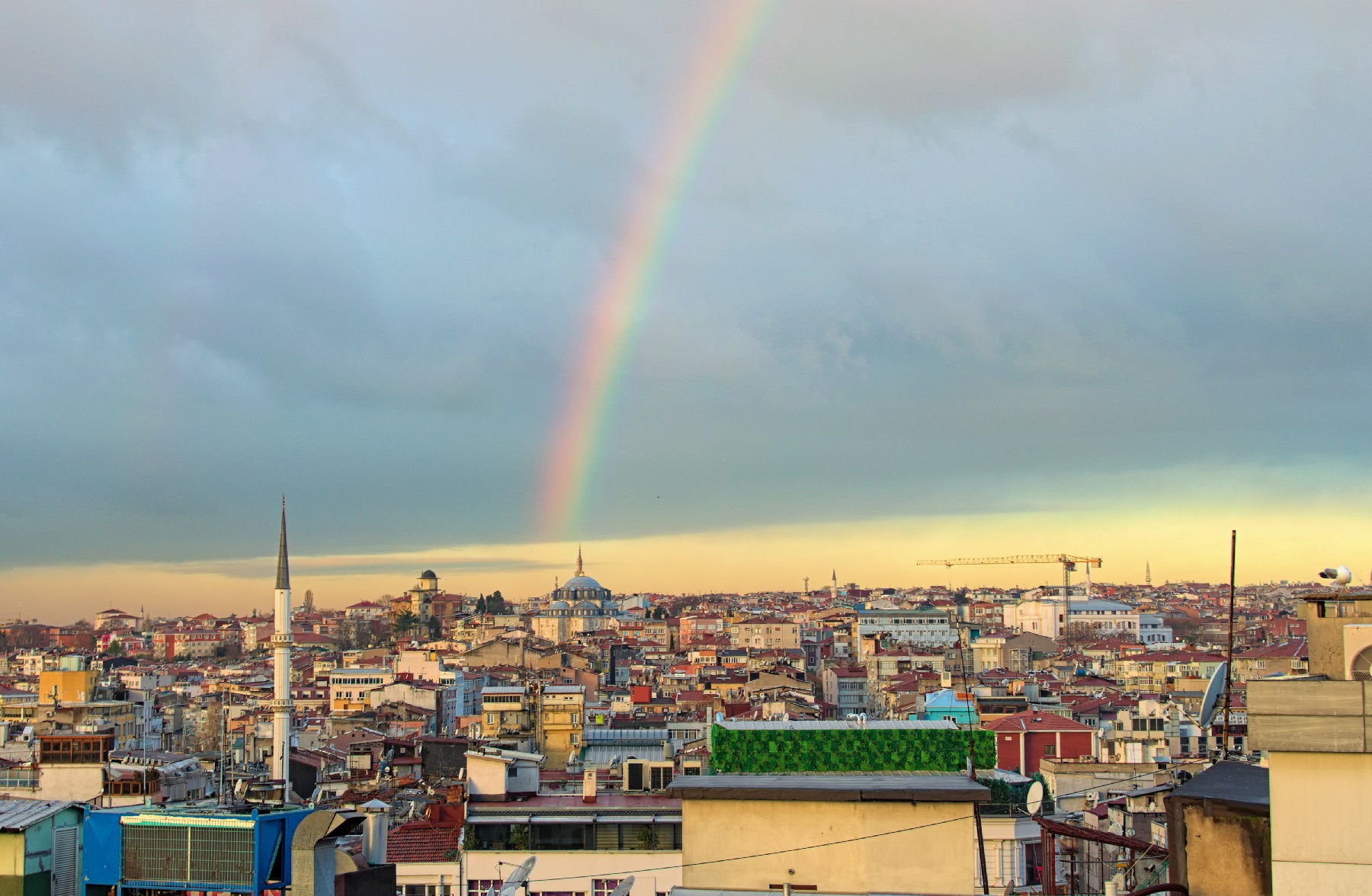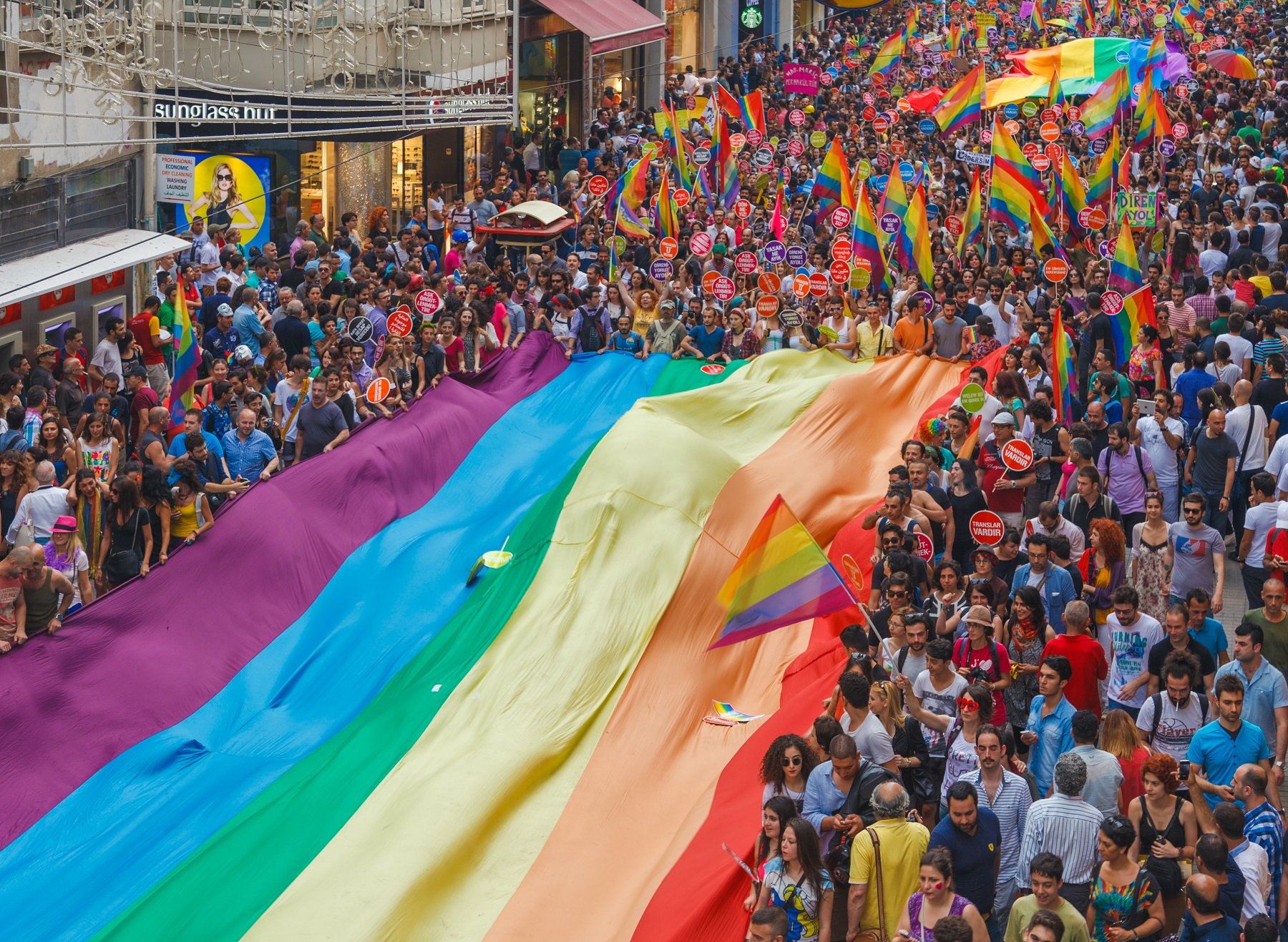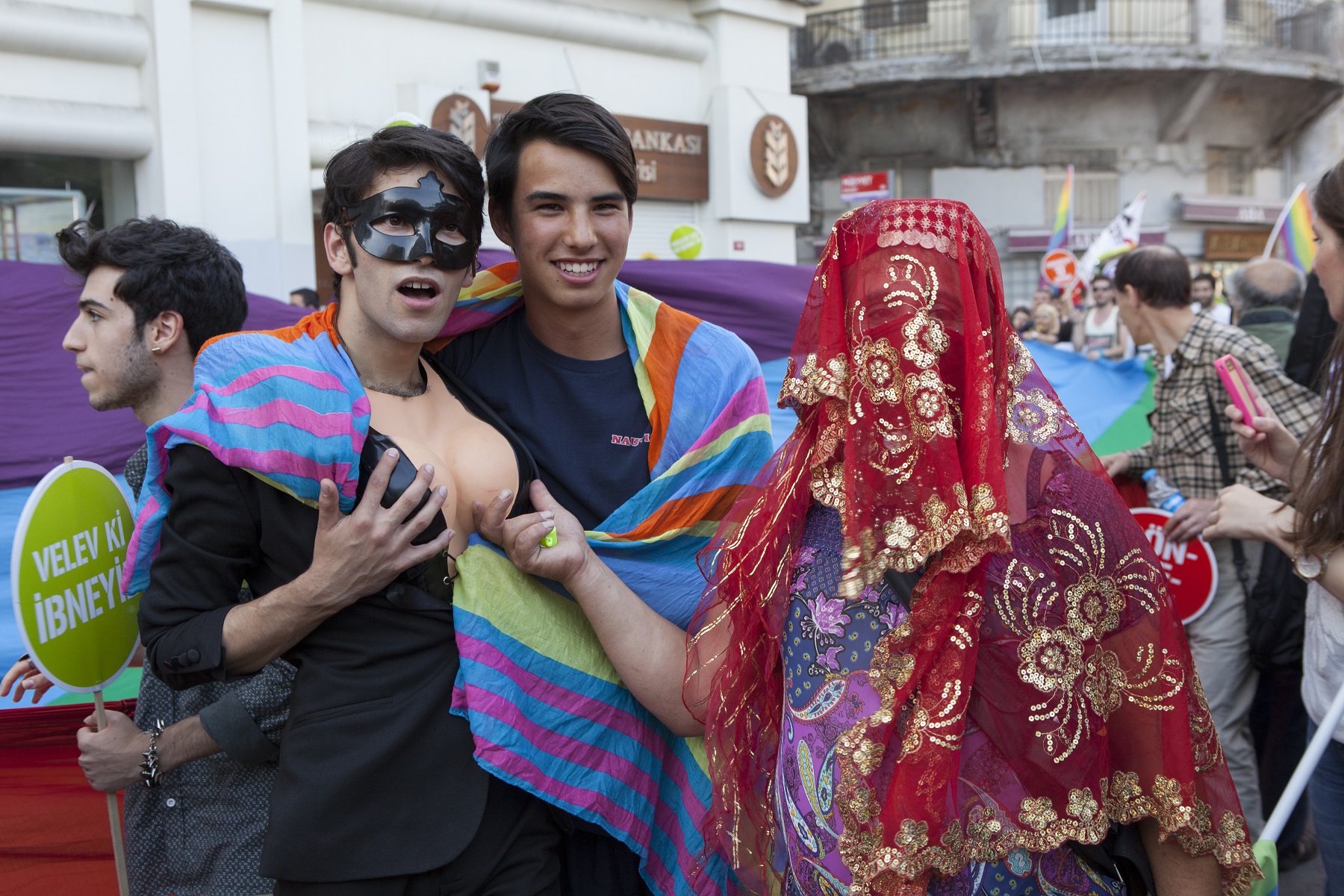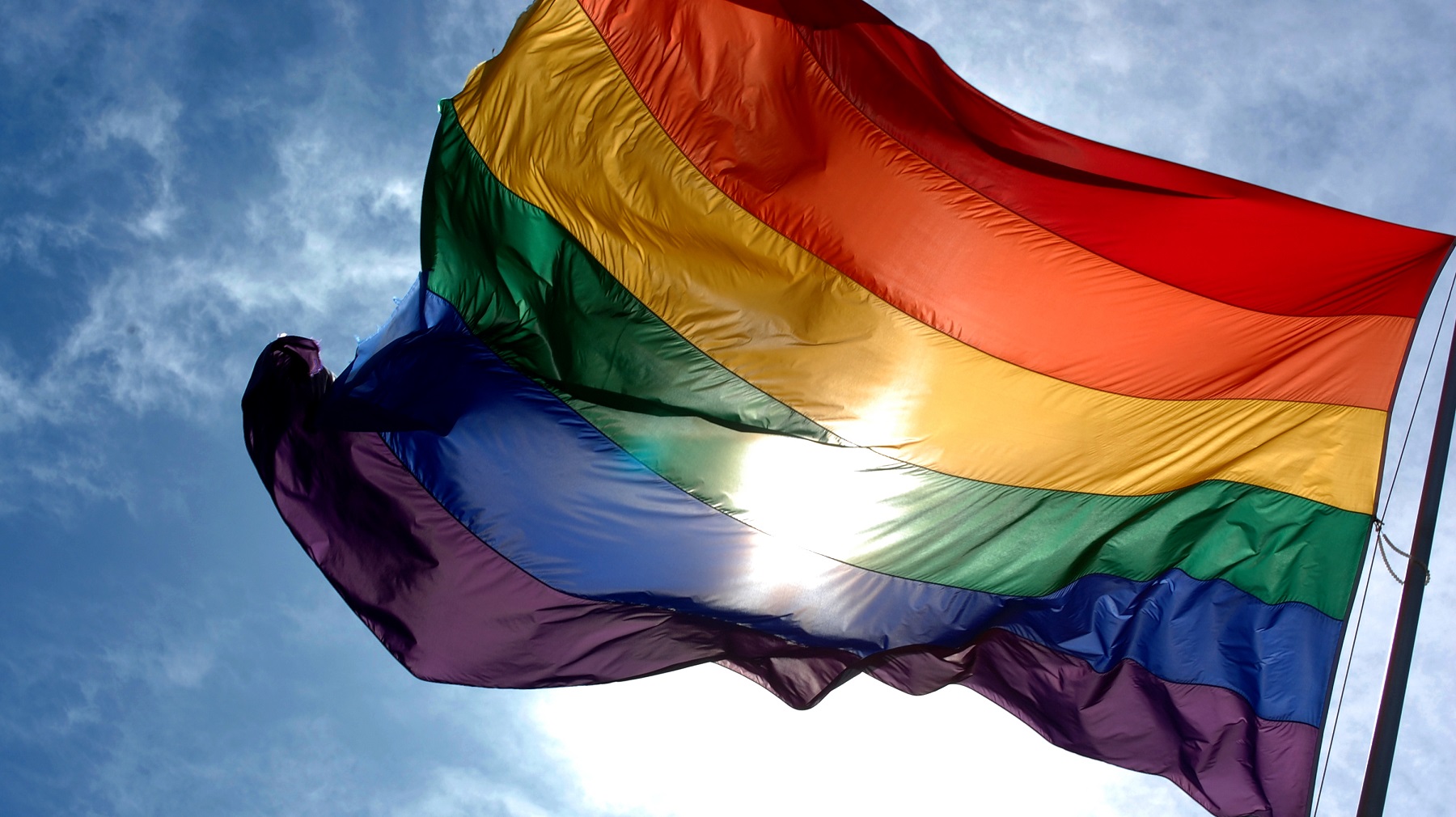The secret language used by LGBTQ people in Turkey
For at least a century, 'Lubunca' has been used by Turkish LGBTQ people as a safe way to communicate. But as police cotton on in an increasingly repressive state, what was once a blessing may be becoming a curse.
By Will Stroude
Always research local laws and customs before travelling. Consult igla.org for up-to-date information.
This article first appeared in Attitude issue 324, Summer 2020
Words: Ruben Wissing
Last December, I was in Istanbul visiting some friends. I love going there, but hadn’t managed to make it to the city for the past four years. Maybe it was because I had witnessed the bloody Gezi Park protests in 2013, or because I saw the footage of a violent military coup in 2016. Or maybe it’s because I think that President Erdoğan has turned the once secular Turkey into a sinister and controlling police state.
It certainly seemed that way when I visited last December. According to the queer female friend I stayed with, armed police have recently started patrolling the streets. Also, a number of (gay) bars have upped sticks and moved to a district in the Asian sector, because the relaxed atmosphere that used to be the norm in Beyoğlu (the centre in the vicinity of Taksim Square and shopping street İstiklal Caddesi) seems to have disappeared. And don’t even consider protesting for matters such as LGBTQ rights – unless you like the sensation of tear gas in your face.
Prides have been halted in a violent manner by the police in recent years, while 44 transgender people have been killed in the past decade, which Transgender Europe claims is the highest number in Europe in relative terms.
In times such as these, the rise in popularity of a secret language, Lubunca (pronounced looboonja), that is spoken by people from within the queer community is no luxury, but a necessity. I had questions: where did this language originate; who is speaking it; and why is it relevant in today’s Turkey?
I knew of the existence of Lubunca from Turkish friends who had told me about it. I knew, for instance, that Lubunca comes from the word lubni, meaning ‘female prostitute’ in Romani, plus that it is made up of words from many different, sometimes completely random, languages. Although almost nothing has been written about it in Western media, you could see it as a kind of RuPaul slang, according to gender activist and drag queen, Debonair Detsuki, 25 – but in a completely different culture, and with roots extending back to the Ottoman Empire.
“Although there are quite a few similarities in how they are used, RuPaul’s slang has its origins in the underground ball scene, while Lubunca was created by trans sex workers in hammams in Beyoğlu. They came up with certain words to protect themselves, so that nobody around them could understand what they were communicating about, which is why the words are primarily sexual in nature,” says Debonair. “The average Turk does not understand Lubunca. The grammar is the same as in Turkish, but essential words within sentences are replaced.”

Chasing rainbows: Istanbul is not as LGBTQ-friendly as it once was
The language consists of some 400 words and word endings (to lend them more of a sassy edge), and is constantly being amended. There are words such as gullüm, for instance (a word that does not have a direct translation, but can be applied to everything as it sounds rather snappy), or koli. “In Turkish, the latter simply means ‘cardboard box’, but in Lubunca it means ‘sex partner’,” says Hakan Özkan, 27, an activist from Istanbul, who works for various Turkish and international LGBTQ organisations, such as the youth organisation IGLYO. “You might hear people say ‘I emptied my koli yesterday’ or ‘I put my stuff in a koli this morning’. You’d really need to know what someone was talking about, though. We might not have a word for ‘work’, but we have three different ways of stating the size of a penis.”
There are certain special words for sexual positions, body parts, makeup, money, police, shifty and creepy types to watch out for, and words for labelling people. According to trans sex worker and ardent Lubunca speaker, Sinem (not her real name), this is what Lubunca was primarily intended for. “Male and trans prostitutes had to go underground when the Republic of Turkey was founded in the 1920s; they had all become a target virtually overnight,”
says Sinem.
The decadent late-Ottoman life, where there was room for trans prostitutes and köçeks – young male dancers and cross-dressers – had been forever resigned to the past. Sex work moved from the hammam (which was wonderfully depicted in the 1997 film Steam by Ferhan Özpetek) to the street, and was illegal, with all that came with it. It is thought that this was the period when certain words were incorporated and corrupted from Romani, Greek, Armenian and other languages, which were either not or barely spoken in the poor districts of Istanbul. This made it safe enough to speak your mind in the centre of the city. And so, during the past century, Lubunca developed as a defence mechanism for trans sex workers.
Teacher and former sex worker, Zelal Demir, 38, mainly used Lubunca some 15 years ago to protect herself from macho men, but also from clients and the police. “We had to come up with multiple words for ‘police’, because the authorities started to get wise to our synonyms after a while,” said Zelal, who was arrested for her work at one point.
Sinem, who lost her parents at a young age, left a small village in Anatolia for Istanbul and tried in vain to find a better life in the big city. “I had no choice, basically. I had no job, no money, and no home. I got hooked on various types of drugs, and before I knew it, I was on the game. Luckily, there were other girls there, and they taught me Lubunca, which I’m eternally grateful to them for,” says Sinem, shuddering in remembrance.
When in trouble, Sinem can’t count on help from the police, but relies on swift communication with colleagues. “I remember getting into a car with a client, when I was still hooking in one of the most notorious streets in Istanbul. Just in time, I heard a female friend shout out in Lubunca that the guy was a creep who had severely beaten one of the girls the week before, which allowed me to get out before he realised that I was going to run away,” says Sinem, as if it had been just another day at the office.

Safe word: Lubunca is spoken among Turkey’s LGBQTQ community, seen here at Istabul Pride
These days, she works in a brothel where the staff protect her, but Lubunca is still important to her. “I still need to check with the girls whether or not a situation is safe, and I can alert them if a man goes too far – plus, it’s good for commenting on people without anyone else realising, of course. Lubunca is part of my community. Young gays are showing off with it now, but that wasn’t always the case.”
Up until two decades ago, cis-gays were not at all enamoured with Lubunca. According to Zelal, there was a lot of discrimination against sex workers in Istanbul, also within the LGBTQ community. “When I was a 19-year-old student, I mainly used to hang around the streets and in neighbourhoods where I could easily pick up johns. In clubs and locations that were frequented by middle-class gays, I was often insulted because of the way I spoke Lubunca, as it was a giveaway that I was a prostitute, and therefore from a lower class. It meant you weren’t considered gay, but ibne, which basically means ‘faggot’, and at the time it had the same negative meaning within the community for being the same way heteros use the word.
“Many of the words I used back then are no longer relevant for me now. As a sex worker or trans woman, you speak an advanced version of Lubunca, and that has an immediate impact on your status and identity within the LGBTQ community.”
Activist Hakan says class still plays a key role, “But after the LGBTQ movement became larger and more visible, the internal discrimination also subsided. A large section of the LGBTQ community especially embraced Lubunca after the death of the singer and queer icon Zeki Müren. And, after the Gezi Park protests in 2013, the largest Pride ever, nearly everyone loves it.”
Although Lubunca used to be mainly found in Istanbul, specifically in the Beyoğlu and Şişli neighbourhoods, Hakan says you can encounter it anywhere in Turkey, but especially in the cities. The deeper you go into Anatolia, the less you come across it. “Not just because it is less accepted in the country, LGBTQs who have come out all head for the major cities to escape the social pressure,” he says.
These days, Lubunca is something Zelal mainly speaks for fun, as a cultural expression. “I have also noticed that you really do need Lubunca for some gays and transgender [people]. If you don’t speak it, you’re an outsider. It has become a status thing – although it is also related to being able to express your identity, of course. If you want to find out whether someone is LGBTQ, one word is all it takes.”

LGBTQ lingo: Young gay men have continue to popularise Lubunca among new generations
According to gender activist, Debonair, Lubunca has become fundamental to the daily life of LGBTQ people in Turkey. Slogans, pride banners, names or parties, art and music: Lubunca is everywhere. And what’s more: young gay men are spreading it to such an extent that it has also reached a group that isn’t necessarily LGBTQ or a straight ally. One example Debonair gave us is Kerimcan Durmaz, a hugely popular DJ with millions of followers on social media. He went viral with a song in Lubunca (about an abla, a sister).
“His audience also includes a number of homophobes, which can cause problems for trans sex workers. Basically, I am all for visibility, but Turkey is so hypocritical. Because even if cis-straight people learn Lubunca and its fun, comical words, they are still as homophobic and transphobic as fuck,” says Debonair, who has set up a LGBTQ association at the Technical University in Istanbul.
“There are now quite a few online Turkish LGBTQ influencers who are famous enough to draw Lubunca out of anonymity, and that to me is a bad thing,” adds Debonair. A saying like madilik (things are bad) has already been adopted by the masses, according to the activist. Hakan also confirms that cis-straight people have adopted a few words, with hetero women in particular finding it a hoot to speak.
Is it that big a deal if straights learn Lubunca, whether they’re homophobes or not? It could be a great thing for sure, but, if we think back to Polari, the secret queer language in the UK of the 1950s and 1960s, I really doubt it. Polari was used in the same way back then as Lubunca, and was primarily devised to guarantee the safety of the British LGBTQ community, and secondly as a form of cultural expression.
As soon as Polari became ‘mainstream’, such as with the BBC show Julian and Sandy, the language died out. Suddenly, everyone knew the words (like ‘camp’ and ‘butch’), but that wasn’t a problem, because the circumstances surrounding LGBTQ identity were improving anyway, and the necessity for it had gone. That seems a far cry from how things stand in Turkey at the moment.
Two years ago, Debonair was stood in drag, directly opposite a police unit, during Pride in Istanbul. The police started firing rubber bullets at him, simply because he was standing there defending LGBTQ rights. Meanwhile, as a sex worker, Sinem still ends up in life-threatening situations where the authorities would rather arrest her than the person threatening her life.

“There are young Turks in cities who are confronted with us online and learn from what we’re doing; they slowly get used to us and are eventually more accepting,” Debonair says. “But in general, there are a lot of hate crimes, there is a lot of transphobia and homophobia, and that is happening in the current climate under the dictator Erdoğan, who is making life increasingly difficult for us. This is Turkey — transgenders get killed here.”
That doesn’t sound like a situation whereby Lubunca should become common knowledge.
Opinions are divided as to whether or not Lubunca will die out. Debonair can see that the language is constantly evolving, with new words being added, and a passionate and combative youth who are standing up for their rights. Hakan, however, thinks that Lubunca has an expiry date, but only when empowerment has been achieved within the community.
Zelal, though, is a lot more adamant: “Naturally, Lubunca will cease to exist one day. But we will carry on speaking this language until we die – so for me that’s another 30-odd years.”
